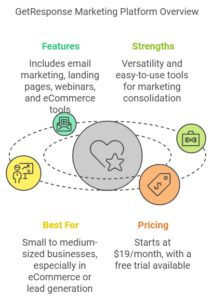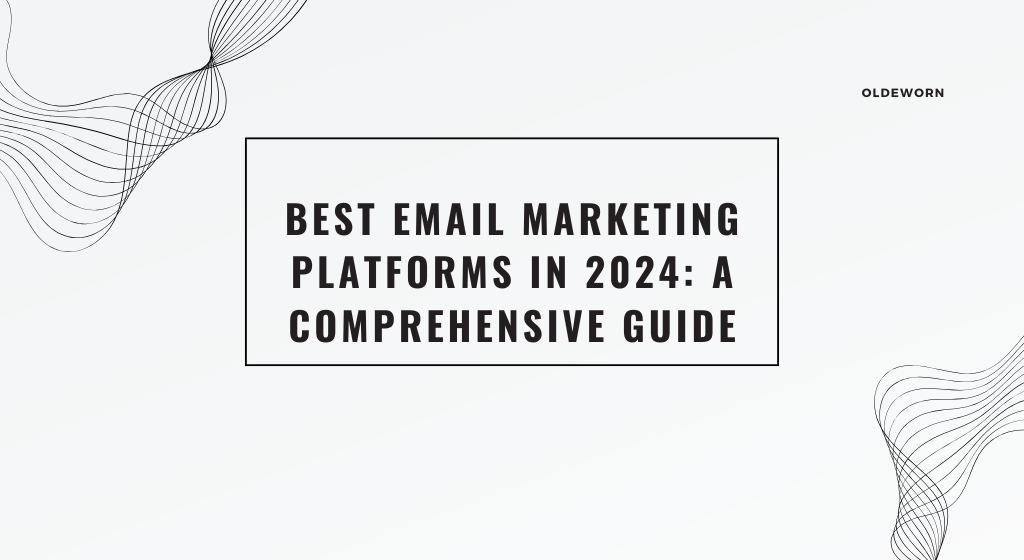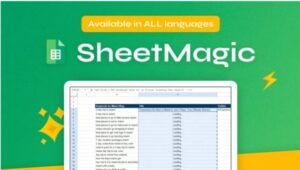Introduction
Email marketing remains one of the most powerful tools in a marketer’s arsenal. With an ROI that often surpasses other marketing channels, it’s no wonder businesses are always on the lookout for the perfect email marketing platform. The right platform can mean the difference between engaging campaigns and wasted resources. But with so many options available, how do you choose? Let’s explore the best email marketing platforms in 2024 and what makes them stand out.
Key Features to Look for in Email Marketing Platforms
Usability and Interface
When it comes to email marketing, simplicity can be a game-changer. Platforms with intuitive drag-and-drop editors make it easy for users to craft stunning emails without any coding knowledge. If you’re a beginner, you’ll want software that doesn’t come with a steep learning curve.
Automation Capabilities
Automation is no longer a luxury—it’s a necessity. Look for platforms offering robust automation features like email triggers based on user actions, drip campaigns, and segmentation. This ensures that your audience receives personalized content without manual intervention.
Customizable Templates
A library of ready-made templates can save you hours of work. Customization options let you tweak designs to align with your brand’s identity, ensuring consistency across all your marketing materials.
Integration Options
Your email marketing platform should seamlessly integrate with other tools like CRM software, social media, and analytics platforms. This connectivity ensures smoother workflows and more accurate data tracking.
Analytics and Reporting
Without clear metrics, you’re flying blind. Platforms offering detailed analytics—open rates, click-through rates, and subscriber engagement—allow you to fine-tune your campaigns for maximum impact.
Top 10 Email Marketing Platforms for 2024
Email marketing platforms have evolved significantly, offering advanced features to cater to a wide range of businesses and marketing needs. Below, we take a detailed look at the top 10 email marketing platforms in 2024, highlighting their unique features, best use cases, and pricing.
1. Mailchimp
Mailchimp remains one of the most popular email marketing platforms, thanks to its versatility and ease of use. It caters to everyone from beginners to seasoned marketers.
- Features:
Mailchimp offers a drag-and-drop email builder, A/B testing, audience segmentation, and pre-designed email templates. It also provides AI-powered recommendations and predictive analytics to help improve your campaigns. - Strengths:
Its user-friendly interface makes it ideal for beginners, while advanced tools like automation workflows and detailed analytics cater to larger businesses. Mailchimp also integrates seamlessly with apps like Shopify, WordPress, and Salesforce. - Best For:
Small businesses, startups, and growing enterprises looking for an all-in-one marketing solution. - Pricing:
Free for up to 500 contacts, with paid plans starting at $13/month.
2. Constant Contact
Constant Contact excels in providing tools that are easy to use, especially for small businesses. It’s a reliable platform for email campaigns and beyond.
- Features:
This platform includes an extensive library of customizable templates, email scheduling, real-time reporting, and list management tools. It also supports event marketing, surveys, and social media advertising. - Strengths:
Its comprehensive customer support and intuitive interface make it a go-to option for beginners. The platform’s event-based marketing tools stand out for businesses running regular events or promotions. - Best For:
Small to medium-sized businesses and nonprofits. - Pricing:
Plans start at $12/month.
3. SendinBlue (Brevo)
SendinBlue, now rebranded as Brevo, is a robust platform that integrates email and SMS marketing. It’s a standout choice for businesses looking to diversify their communication channels.
- Features:
Offers email templates, marketing automation, contact segmentation, and transactional email support. Its SMS marketing integration is a significant plus, allowing businesses to reach customers through multiple channels. - Strengths:
Brevo’s advanced automation workflows and affordability make it an excellent choice for businesses that want a cost-effective solution without compromising on features. - Best For:
SMBs and businesses that require SMS marketing alongside email campaigns. - Pricing:
Free plan available; paid plans start at $25/month.
4. HubSpot Email Marketing
Part of the larger HubSpot CRM platform, HubSpot Email Marketing seamlessly integrates with its suite of tools, making it perfect for businesses aiming to align marketing and sales.
- Features:
Includes professional-grade email templates, drag-and-drop email builder, A/B testing, and automation. Integration with the HubSpot CRM ensures cohesive lead nurturing and detailed tracking. - Strengths:
HubSpot’s CRM-backed capabilities allow marketers to tailor emails based on in-depth customer insights. Its advanced analytics ensure campaigns are data-driven and effective. - Best For:
Businesses already using or planning to use HubSpot’s CRM. - Pricing:
Free for basic features; premium plans start at $45/month.
5. ActiveCampaign
ActiveCampaign is renowned for its automation prowess, offering highly customizable workflows that empower marketers to deliver personalized messages at scale.
- Features:
Includes advanced segmentation, email autoresponders, and machine-learning-powered insights. Its visual automation builder is one of the best in the industry. - Strengths:
ActiveCampaign’s focus on personalization and targeting makes it a favorite among marketers looking to engage audiences meaningfully. It also integrates well with over 850 third-party tools. - Best For:
Businesses prioritizing automation and customer experience. - Pricing:
Plans start at $29/month.
6. GetResponse
GetResponse is a comprehensive platform offering more than just email marketing—it’s an all-in-one marketing hub.
- Features:
Includes email marketing, landing pages, webinars, and eCommerce tools. Its Autofunnel feature simplifies sales funnel creation, making it a great choice for lead generation and nurturing. - Strengths:
GetResponse’s versatility and easy-to-use tools make it a strong option for businesses looking to consolidate marketing activities on a single platform. - Best For:
Small to medium-sized businesses, especially those in eCommerce or lead generation. - Pricing:
Starts at $19/month, with a free trial available.

7. ConvertKit
ConvertKit is designed with creators in mind, focusing on simplicity and engagement for bloggers, YouTubers, and podcasters.
- Features:
Offers automation tools, simple email templates, and an intuitive tagging system. ConvertKit also includes landing pages and forms to help creators grow their audience. - Strengths:
It prioritizes user-friendly tools for creators who may not have technical expertise, allowing them to focus on content rather than complex setups. - Best For:
Content creators, influencers, and small businesses looking to build strong subscriber relationships. - Pricing:
Free for up to 300 subscribers; paid plans start at $9/month.
8. AWeber
AWeber is one of the oldest email marketing platforms and remains a reliable choice for small businesses.
- Features:
Offers pre-designed email templates, a drag-and-drop editor, automation, and detailed reporting. It also supports split testing and integrations with popular platforms like WordPress. - Strengths:
Its extensive experience in email marketing means AWeber offers tried-and-true tools that are both stable and effective. - Best For:
Small businesses looking for a straightforward platform without unnecessary complexity. - Pricing:
Free for up to 500 subscribers; paid plans start at $19.99/month.
9. Drip
Drip is an eCommerce-focused email marketing platform with tools specifically designed to drive online sales.
- Features:
Includes advanced customer segmentation, pre-built workflows, and analytics focused on eCommerce metrics like average order value and lifetime value. - Strengths:
Drip’s integration with eCommerce platforms like Shopify and WooCommerce, along with its detailed customer journey tracking, makes it an excellent choice for online stores. - Best For:
eCommerce businesses aiming to boost revenue through email marketing. - Pricing:
Plans start at $39/month.
10. Moosend
Moosend is a budget-friendly email marketing platform that doesn’t compromise on functionality.
- Features:
Offers automation, customizable templates, analytics, and transactional email services. It also includes a drag-and-drop email builder for easy design. - Strengths:
Its affordability makes it accessible for small businesses, while still offering features like AI-driven recommendations and detailed reporting. - Best For:
Budget-conscious businesses that still want advanced features. - Pricing:
Starts at $9/month, with a free trial available.
These platforms provide a range of options, from budget-friendly solutions for small businesses to robust systems for enterprises. By understanding your business goals, budget, and desired features, you can select the platform that best aligns with your needs.
How to Choose the Best Platform for Your Business
Assessing Your Business Needs
Start by analyzing your goals. Are you a small business owner trying to build brand awareness, or an eCommerce store focused on driving sales? A content creator may need simpler tools, while a corporation may require enterprise-level integrations.
Budget Considerations
Platforms like Mailchimp and Moosend offer free plans, but premium plans often provide greater flexibility. Consider how much you’re willing to invest based on the ROI email marketing typically generates.
Scalability and Growth
As your business grows, your email marketing needs will evolve. Opt for a platform that can handle increased subscribers, more complex workflows, and advanced automation.
Benefits of Email Marketing Platforms
Increased Engagement
Automated workflows and tailored content keep your audience interested. Segmentation ensures that the right message reaches the right people, boosting open and click-through rates.
Better ROI
Email marketing consistently delivers one of the highest ROIs among digital marketing channels. By choosing the right platform, you can amplify these returns significantly.
Time Efficiency
With automation tools, you can schedule emails, manage subscriber lists, and analyze performance—all without manual intervention. This frees up time for strategizing and other business priorities.
Common Mistakes to Avoid When Using Email Marketing Platforms
Ignoring Analytics
Metrics like open rates, bounce rates, and click-through rates provide invaluable insights into campaign performance. Skipping these metrics is like driving without a map—you won’t know where to improve.
Overloading Subscribers
Flooding your audience with emails can lead to high unsubscribe rates. Instead, maintain a consistent but reasonable email frequency.
Neglecting Mobile Optimization
A majority of users check their emails on mobile devices. Ensuring your emails are mobile-friendly is no longer optional; it’s essential.
The Future of Email Marketing Platforms
AI Integration
AI is revolutionizing email marketing with predictive analytics, personalized recommendations, and automated content creation. Platforms leveraging AI will dominate the market in the coming years.
Advanced Segmentation
Future platforms will likely offer even more precise audience segmentation, allowing marketers to craft hyper-targeted campaigns.
Data Privacy and Compliance
With stricter data privacy regulations worldwide, platforms focusing on compliance (like GDPR and CCPA) will gain trust and popularity.
Conclusion
Choosing the right email marketing platform is critical for any business aiming to connect with its audience effectively. With options like Mailchimp, ActiveCampaign, and Moosend, there’s a solution for every need and budget. Take your time to experiment with different platforms, and don’t forget to keep track of performance metrics to optimize your strategy.
FAQs
1. What is the most user-friendly email marketing platform for beginners?
Mailchimp and ConvertKit are excellent choices for beginners due to their intuitive interfaces and step-by-step guides.
2. How much should I budget for an email marketing platform?
Costs vary widely, from free plans to enterprise-level solutions costing hundreds of dollars monthly. Start with a free trial to gauge a platform’s value.
3. Are free email marketing platforms effective for small businesses?
Yes, many free platforms like Mailchimp provide robust features that cater to small businesses. However, advanced features often require upgrading to paid plans.
4. Can I switch platforms later if I’m not satisfied?
Most platforms allow data export, making switching relatively easy. Always back up your subscriber list and campaign data.
5. What’s the biggest trend in email marketing for 2024?
AI-driven automation and hyper-personalization are emerging as key trends, allowing businesses to engage audiences like never before.




